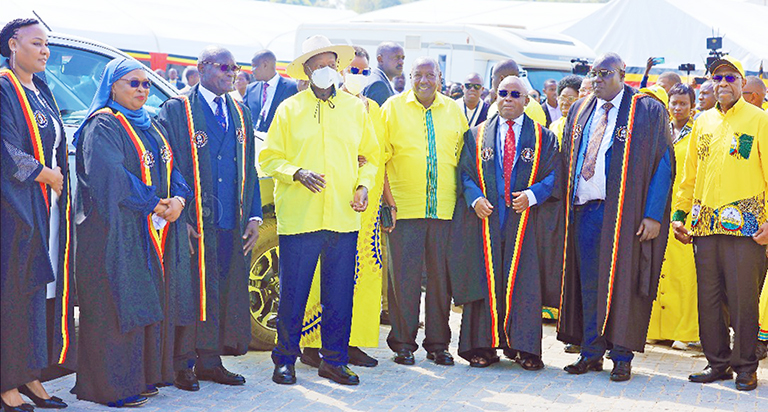KAMPALA — President Yoweri Kaguta Museveni walked off the stage at Kololo Independence Grounds this week with the ruling party’s nomination firmly in hand, ready to extend his hold on Uganda for another five years. The moment was wrapped in the usual trappings of loyalty and celebration: party faithful cheering, NRM Secretary General Richard Todwong praising him as a “steady guide,” and calls for unity against rivals in next year’s elections.
Yet outside the glow of Kololo, another sound is rising, less celebratory, more insistent. It is the rumble of disgruntled arts teachers, who accuse Museveni’s government of institutionalizing inequality by paying science teachers more while leaving them on subsistence salaries. In private schools, many earn as little as Shs 200,000 a month, a figure so low that some abandon the classroom altogether.
Deputy Speaker of Parliament Thomas Tayebwa put the problem bluntly: “Most of the teachers in the art schools are not even paid. When we go to the village and engage with them, especially the ones in rural schools, they are not even paid.”
For Museveni, the pay disparity is no accident; it is a strategy. In his speech, he made no apology for prioritizing scientists, calling them the “engine of Uganda’s economic transformation.” Roads, hospitals, power stations, agriculture, all, he argued, require the immediate expertise of engineers, doctors, and extension workers. The arts, he acknowledged with a touch of humor, could wait.
“I am a man of literature. I can quote for you Shakespeare and all that,” he said. “But when there is a problem on the road, I can’t help you. We need engineers. Let’s finish them, then we shall go to the arts.”
The logic is clear: Museveni wants to build an economy anchored in science and technology. But the political risk is equally stark. Arts teachers are not just employees; they are voters, opinion shapers in villages and towns, often the most educated members of their communities. Alienating them in an election cycle carries consequences.
Their argument is not even about dethroning scientists. “Our quarrel has not been the amount they are earning,” one teacher told Tayebwa. “We are only saying, if you have given so-and-so more, we also want fairness.” That demand for fairness has a way of resonating beyond staff rooms, cutting across a wider electorate that feels left out of Uganda’s growth narrative.
In a campaign where opposition figures like Robert Kyagulanyi, Maj. Gen. Mugisha Muntu, and Nandala Mafabi will seek to position themselves as champions of ordinary people, Museveni’s refusal to budge on the pay gap could become ammunition.
A Balancing Act
Museveni’s approach reveals the larger balancing act of his campaign. On one hand, he wants to present himself as the visionary economist, willing to take unpopular decisions in service of long-term transformation. On the other, he must contend with the lived realities of Ugandans who feel that progress has not trickled down, that fairness matters as much as growth.
The arts-versus-sciences pay debate touches a nerve because it speaks to a broader inequality, between rural and urban, poor and middle class, those in power and those who feel invisible. Teachers in neglected rural schools, struggling to pay rent or buy food, embody that frustration in a way that can be politically potent.
At Kololo, Todwong framed the campaign as a collective party mission: “This is a party campaign, not an individual campaign. We call upon those thinking of standing as independents to reconsider and rally behind all flag bearers.” The message was unity, discipline, mobilization.
But even as the NRM rallies door-to-door, stage-to-stage, it faces a question: can it rally classrooms full of underpaid arts teachers who feel dismissed by the very government they serve?
Museveni’s scientific pragmatism may play well with voters who want to see more hospitals, roads, and electricity. But his dismissal of arts teachers’ concerns risks painting him as indifferent to fairness, a dangerous perception in an election where rivals will try to cast him as out of touch.
The Road Ahead
As the Electoral Commission officially continues to nominate all candidates, requiring academic papers, nomination fees, and district-level endorsements, the race for the State House will gather speed. Museveni enters it with the machinery of the NRM behind him, a loyal base, and a reputation for stability.
But in schoolrooms across Uganda, teachers will be watching closely. For them, this is not a debate about Shakespeare versus engineers. It is about dignity, fairness, and the value of their work in shaping Uganda’s future citizens.
If Museveni can convince them that their turn will indeed come, he may keep the “arts teacher monkey” off his back. If not, their frustration could echo far beyond the classroom, right into the heart of the campaign.

